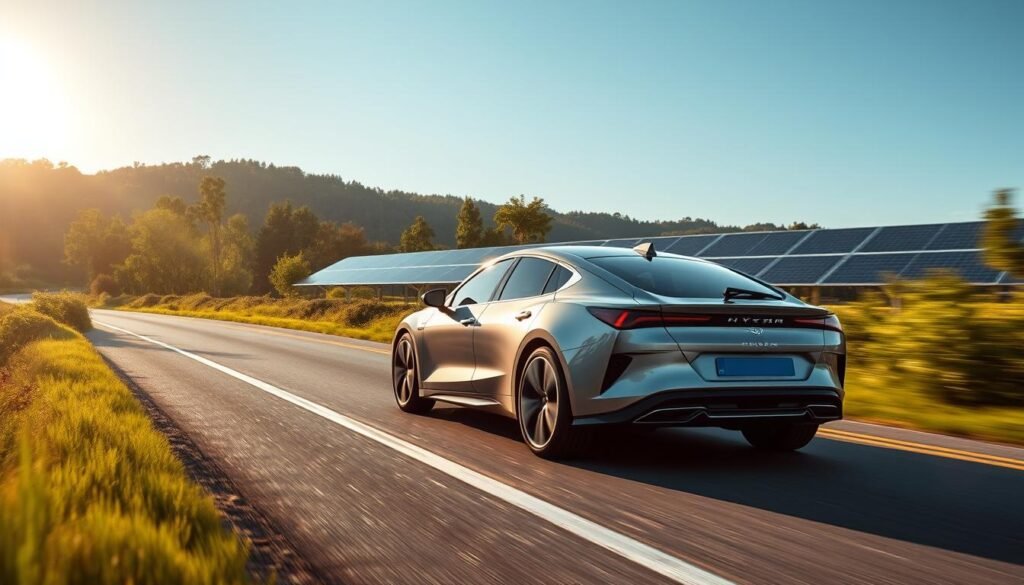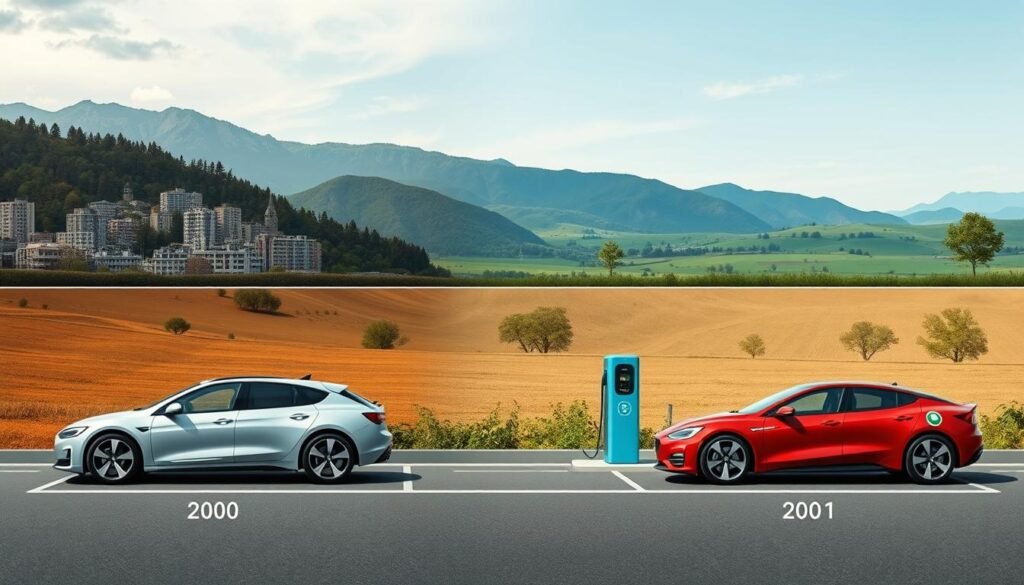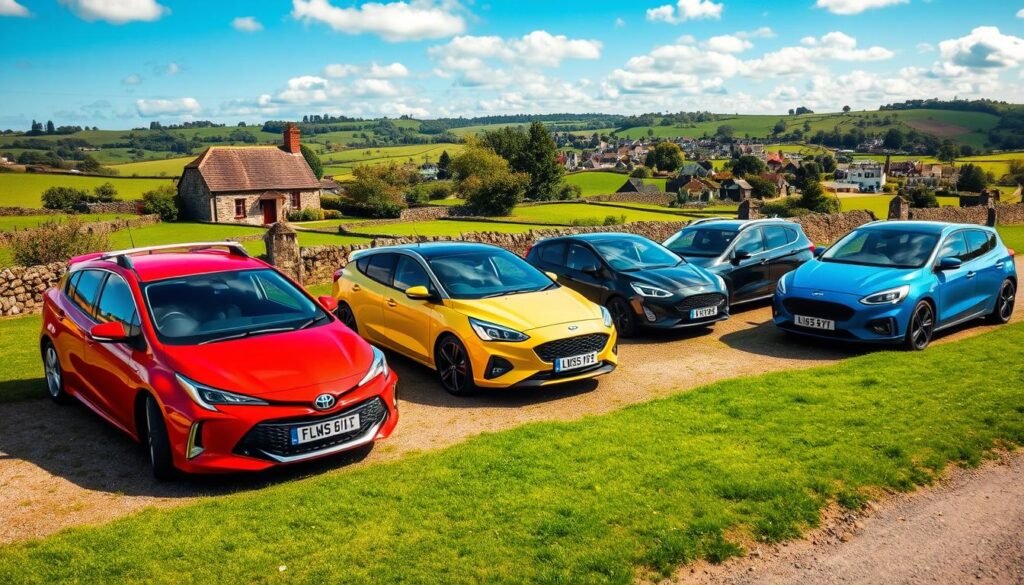In today’s world, cars that use both gas and electric are becoming more popular. They mix traditional gas engines with electric motors. This makes them a key player in finding ways to drive that are better for the planet.
Hybrid cars are a middle ground between old gas cars and new electric ones. They use the strengths of both types of engines. This makes them a big step forward in how we travel, helping the environment and meeting our needs.

Key Takeaways
- Hybrid cars combine traditional gasoline engines with electric motors, offering increased fuel efficiency and reduced emissions.
- These vehicles represent a transitional solution between conventional gas-powered cars and fully electric models.
- Hybrid technology plays a crucial role in the shift towards sustainable transportation, addressing environmental concerns and meeting the needs of modern drivers.
- Hybrid cars provide a balance between performance, cost, and environmental impact, making them an attractive option for a wide range of consumers.
- The rise of hybrid vehicles reflects the ongoing evolution of the automotive industry and its commitment to a greener, more efficient future.
Understanding Hybrid Cars: The Best of Both Worlds
Hybrid cars offer a great alternative to traditional gas-powered vehicles. They combine gasoline engines and electric motors. This mix gives drivers a unique experience that saves fuel and is better for the environment.
Basic Components of Hybrid Vehicles
Hybrid cars have a few key parts. These include a gasoline engine, an electric motor, a battery pack, and a special powertrain. This setup makes hybrid cars stand out. They use the power of gas engines and the efficiency of electric motors.
How Hybrid Powertrains Function
Hybrid powertrains use both the gas engine and electric motor smartly. In slow or stop-and-go traffic, the electric motor helps. This cuts down on gas use. When more power is needed, the gas engine kicks in. The electric motor still helps out.
Different Types of Hybrid Systems
- Parallel Hybrid: The gas engine and electric motor work together. The electric motor adds power and efficiency.
- Series Hybrid: The electric motor is the main power source. The gas engine recharges the battery.
- Plug-in Hybrid: These cars can be charged from outside. They can go longer on electric before needing gas.
Hybrid systems offer flexibility for different driving needs. This makes hybrid cars a popular choice for many drivers today.
The Evolution of Hybrid Technology in the Automotive Industry
The journey of hybrid cars has been exciting, with fast progress in automotive tech. From the early 2000s to today, hybrid tech has changed how we see green transport.
The Toyota Prius in 1997 was a big step. It showed how a car could use both an engine and an electric motor. This mix of power and efficiency was a game-changer.
Over time, hybrid tech got even better. Cars now use regenerative braking to save energy. This makes them more fuel-efficient and cuts down on pollution.
In the UK, car makers have really pushed hybrid tech forward. Plug-in hybrids are especially popular. They let drivers use electric for short trips and gas for longer ones.
Now, hybrid cars are a big part of the car world. They meet the need for cars that are good for the planet and save fuel. As we all try to live greener, hybrid tech is key to a better future for cars.

“The future of transportation lies in the seamless integration of hybrid technology, where efficiency, performance, and environmental responsibility converge to create a truly remarkable driving experience.”
Key Benefits of Hybrid Cars for Modern Drivers
Hybrid cars are becoming more popular in the UK. They are eco-friendly and save fuel. These cars meet the needs of today’s drivers who care about the planet.
Improved Fuel Economy and Cost Savings
Hybrid cars use less fuel than regular cars. They mix a gasoline engine with an electric motor. This means you spend less on gas and help the environment.
Environmental Impact and Carbon Footprint
Hybrid cars are better for the planet. They make less pollution than gas cars. This is thanks to their electric motor and smart braking system.
Performance and Driving Experience
Hybrid cars are fun to drive. They have a smooth start thanks to their electric motor. This makes driving more enjoyable and efficient.
In the UK, hybrid cars are a smart choice. They save money, are good for the planet, and drive well. They’re a step towards a greener future.

| Benefit | Description |
|---|---|
| Fuel Efficiency | Hybrid cars can achieve significantly higher fuel efficiency than traditional gasoline-powered vehicles, leading to substantial cost savings for drivers. |
| Environmental Impact | Hybrid vehicles have a smaller carbon footprint and generate lower greenhouse gas emissions, contributing to a more sustainable transportation solution. |
| Performance | Hybrid cars offer a dynamic and responsive driving experience, with seamless integration of electric motors and gasoline engines. |
“Hybrid cars represent the future of sustainable transportation, combining the best of both worlds for modern drivers in the UK.”
Popular Hybrid Car Models in the UK Market
The UK market has seen a surge in the popularity of hybrid cars. These cars offer a more sustainable and efficient way to travel. Here’s a look at some of the most popular hybrid car models available in the region.
Toyota Prius
The Toyota Prius has been a leader in hybrid cars for years. It’s a mid-size hybrid that offers great fuel economy and a comfortable ride. Prices start at around £24,000.
Honda CR-V Hybrid
The Honda CR-V Hybrid is a favorite among families. It’s a spacious and eco-friendly SUV. It starts at approximately £31,000.
Hyundai Kona Hybrid
The Hyundai Kona Hybrid is a compact crossover. It has impressive fuel economy and a modern design. Priced from around £22,000, it’s a great choice for those who want to save money and the planet.
Ford Kuga Plug-in Hybrid
The Ford Kuga Plug-in Hybrid offers a more advanced hybrid experience. It combines an electric motor with a traditional gasoline engine. This gives it an all-electric range of up to 35 miles. Prices start at approximately £33,000.
| Model | Starting Price (UK) | Fuel Economy (Combined) | CO2 Emissions |
|---|---|---|---|
| Toyota Prius | £24,000 | 56-58 mpg | 88-92 g/km |
| Honda CR-V Hybrid | £31,000 | 47-48 mpg | 102-106 g/km |
| Hyundai Kona Hybrid | £22,000 | 52-56 mpg | 92-102 g/km |
| Ford Kuga Plug-in Hybrid | £33,000 | 201.8 mpg | 32 g/km |
These hybrid car models show the wide range of options for UK drivers. They offer a more sustainable way to travel and help reduce carbon footprint.

How Hybrid Cars Reduce CO2 Emissions
Hybrid vehicles are changing the car world. They offer a green way to cut down CO2 emissions and harm to the environment. These cars use electric motors and traditional engines together. This mix makes them more energy-efficient and cuts down carbon emissions.
Regenerative Braking Systems
Regenerative braking is a key feature in hybrid cars. It captures energy when you brake and stores it in the battery. This means hybrids use less gasoline, saving fuel and cutting down on carbon emissions.
Electric Motor Efficiency
Hybrid cars have super-efficient electric motors. They work with the gasoline engine for a smooth ride. These motors are great at turning electrical energy into movement, helping to lower emissions.
Smart Energy Management
Hybrid cars have smart systems that manage energy well. They decide when to use the electric motor or the gasoline engine. This smart switching helps hybrids run more efficiently, reducing their environmental impact.
Hybrid cars are a top choice for those who care about the planet. They use regenerative braking, electric motors, and smart energy systems. This makes them a key part of a greener future.

Maintenance and Long-term Ownership Costs
Hybrid cars might cost a bit more upfront than regular cars. But, they save money in the long run. They use fuel efficiently and have advanced technology, leading to big savings for drivers in the UK.
The battery life of a hybrid car is a big plus. It’s made to last as long as the car itself. With the right care, it can last even longer. Car makers usually give a long warranty on the battery, giving owners confidence.
Hybrid cars need less upkeep than traditional cars. Their braking system helps brake pads last longer, saving on replacements. They also have fewer parts, which means lower repair costs over time.
| Maintenance Item | Hybrid Car | Gasoline Car |
|---|---|---|
| Brake Pad Replacement | Every 50,000-70,000 miles | Every 30,000-40,000 miles |
| Engine Oil Change | Every 10,000-12,000 miles | Every 5,000-7,500 miles |
| Transmission Fluid Change | Not Required | Every 30,000-60,000 miles |
Hybrid cars are great for saving on fuel costs, especially in city driving. This can make up for the higher initial cost. They’re a smart choice for those wanting to save money and help the environment.
Hybrid Cars: Bridging the Gap Between Gas and Electric
Hybrid cars are key in the shift from gas to electric vehicles. They mix the good parts of both, leading to a greener future for UK roads.
These cars use a gas engine and an electric motor. They switch between these sources based on how you drive. This makes them more fuel-efficient, cuts down on emissions, and gives a smoother ride than gas-only cars.
Hybrids use regenerative braking to capture energy when you brake. This energy helps charge the battery. It makes the car more efficient and cuts down on pollution.
| Feature | Hybrid Cars | Gasoline Vehicles |
|---|---|---|
| Fuel Economy | Improved fuel efficiency, up to 60 mpg | Lower fuel efficiency, typically 25-35 mpg |
| Emissions | Reduced CO2 and other pollutants | Higher CO2 and pollutant emissions |
| Driving Experience | Smooth, quiet, and responsive | Louder, less responsive engine |
In the UK, hybrids are seen as a bridge to electric cars. They offer eco-friendly benefits, cost savings, and a familiar driving feel. This makes them a practical choice for many drivers.
Government Incentives and Tax Benefits for Hybrid Owners
In the UK, drivers can get financial help to switch to hybrid cars. The government offers incentives and tax breaks for hybrid owners. These help make hybrid cars more affordable and encourage people to choose them.
UK Government Grants
The UK’s Plug-In Car Grant gives up to £2,500 off the price of a new hybrid. This grant makes eco-friendly cars more affordable for many people.
Road Tax Advantages
Hybrid car owners in the UK pay less road tax. The tax is based on the car’s CO2 emissions. Hybrids usually pay less because they’re more fuel-efficient and better for the environment.
Local Authority Benefits
- Some local authorities offer free or discounted parking for hybrid owners.
- Cities like London let hybrids avoid congestion charges. This saves money on driving.
- In some places, hybrids get special access to bus lanes. This cuts down travel time.
These benefits make hybrid cars a great choice for UK drivers. They save money and help the environment. By using these incentives, hybrid owners get the best of both worlds.
Comparing Hybrid vs Traditional Gasoline Vehicles
The debate between hybrid and traditional gasoline cars is growing. These vehicles differ in performance, fuel efficiency, and environmental impact. Drivers in the UK face choices based on these factors.
Performance and Fuel Efficiency
Hybrid cars offer a mix of power and fuel savings. They combine a gasoline engine with an electric motor. This results in better fuel economy than gasoline-only cars.
Many top-selling hybrids in the UK get over 50 miles per gallon. This makes them great for saving on fuel costs and reducing carbon footprint.
Environmental Impact
Hybrid cars have a big advantage in emissions. They can run on electric power alone, lowering greenhouse gas emissions. This is especially true in cities where traffic is heavy.
This makes hybrids a greener choice for those worried about the environment.
| Metric | Hybrid Cars | Gasoline Vehicles |
|---|---|---|
| Fuel Efficiency (MPG) | 45-60+ | 30-45 |
| CO2 Emissions (g/km) | 75-100 | 120-180 |
| Overall Cost of Ownership | Moderate to High | Moderate to Low |
Hybrids are pricier upfront but can be cost-effective over time. They save on fuel and may get tax breaks. The choice between a hybrid and a gasoline car depends on personal needs and priorities in the UK.
“Hybrid cars represent a significant step forward in bridging the gap between the convenience of gasoline-powered vehicles and the environmental benefits of electric mobility.”
Future Trends in Hybrid Technology
The car industry is changing fast, and hybrid cars are leading the way. We can expect big leaps in battery tech and smart city links. These changes will make driving greener and more efficient.
Advanced Battery Technologies
New battery systems are a big deal for hybrid cars. Scientists are working on solid-state and lithium-ion batteries. These will make cars go further on a single charge and charge up quicker.
Integration with Smart Cities
Hybrid cars will be key in smart cities. As cities get smarter, hybrids will help use energy better. They’ll work with smart grids and traffic systems to cut emissions and improve travel.
Upcoming Innovations
Hybrid tech is set for a lot of new ideas soon. Car makers are trying out new powertrains that mix electric and gas engines. They’re also adding self-driving tech and V2X communication. This will make hybrids even better for the future.
Hybrid cars are set to make driving better and greener. With better batteries, smart city links, and new powertrains, they’re shaping the future of cars. They’ll be a big part of making driving more sustainable and high-tech.
Common Myths and Misconceptions About Hybrid Cars
There are many myths and misconceptions about hybrid cars in the UK. These can stop people from choosing this eco-friendly option. It’s important to clear up these myths with facts to help drivers make better choices.
Many think hybrid cars are slow and lack power. But, many modern hybrids are fast and powerful. They combine an electric motor with a gasoline engine for a smooth and quick drive.
Some believe hybrids are too pricey. True, they might cost more upfront. But, they save money on fuel and maintenance over time. Plus, UK government incentives and tax breaks make hybrids more affordable for many.
FAQ
What are the basic components of a hybrid vehicle?
Hybrid cars have a few key parts. These include a gasoline engine, an electric motor, a battery pack, and a control unit. The control unit manages how the engine and motor work together.
How do hybrid powertrains function?
Hybrid cars use both a gasoline engine and an electric motor. They can run on electric power alone, gasoline alone, or both together. This depends on how you drive and the car’s battery level.
What are the different types of hybrid systems?
There are many hybrid systems out there. You’ve got parallel, series, and plug-in hybrids. Each type is made to fit different driving needs and preferences in the UK.
How does regenerative braking work in hybrid cars?
Regenerative braking is a key feature of hybrids. It captures energy when you brake and stores it in the battery. This energy helps power the motor, making the car more efficient and saving fuel.
What are the long-term maintenance costs of owning a hybrid car?
Hybrid cars usually cost less to maintain than regular cars. They have simpler parts and less wear on the engine. But, you should think about the cost of replacing the battery later on.
What government incentives and tax benefits are available for hybrid car owners in the UK?
The UK government gives out incentives and tax breaks for hybrid owners. You can get grants for buying certain cars, pay less road tax, and enjoy other perks like cheaper parking.
How do hybrid cars compare to traditional gasoline vehicles in terms of performance and fuel efficiency?
Hybrid cars are better at using fuel and making less CO2 than regular cars. They still perform well, thanks to the engine and motor working together efficiently.
What are some common myths or misconceptions about hybrid cars?
Some people think hybrids are slow, unreliable, or have a short range. But, modern hybrids are fast, reliable, and have enough range for most UK drivers.

